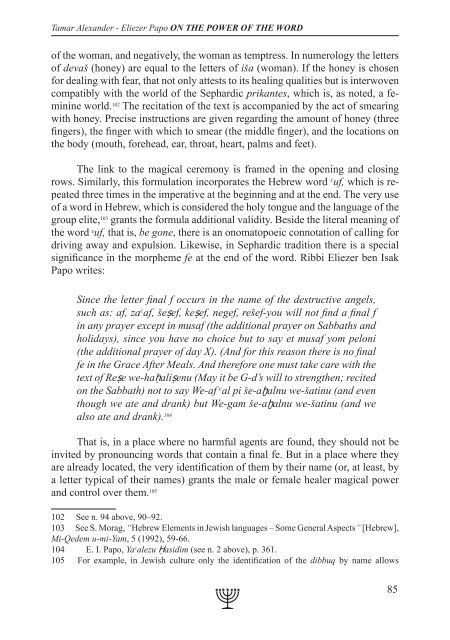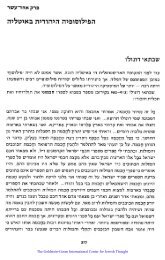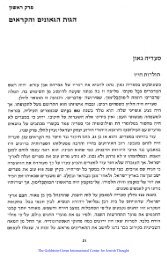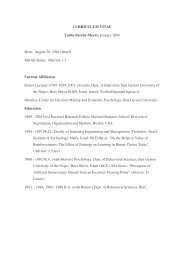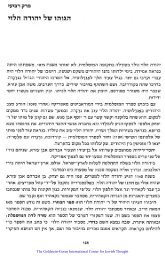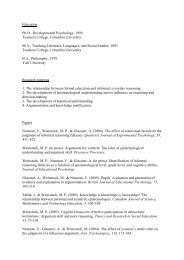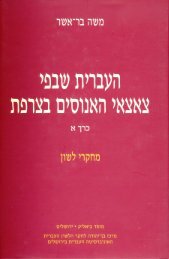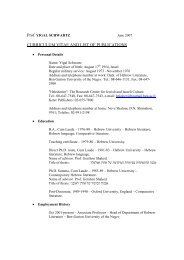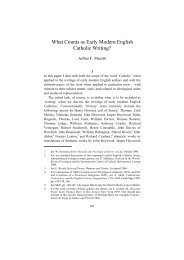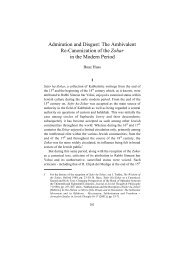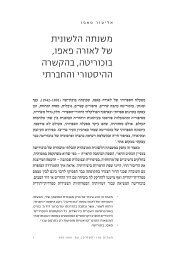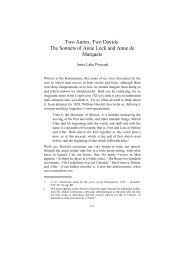You also want an ePaper? Increase the reach of your titles
YUMPU automatically turns print PDFs into web optimized ePapers that Google loves.
Tamar Alexander - <strong>Eliezer</strong> <strong>Papo</strong> ON THE POWER OF THE WORD<br />
of the woman, and negatively, the woman as temptress. In numerology the letters<br />
of devaš (honey) are equal to the letters of iša (woman). If the honey is chosen<br />
for dealing with fear, that not only attests to its healing qualities but is interwoven<br />
compatibly with the world of the Sephardic prikantes, which is, as noted, a feminine<br />
world. 102 The recitation of the text is accompanied by the act of smearing<br />
with honey. Precise instructions are given regarding the amount of honey (three<br />
fingers), the finger with which to smear (the middle finger), and the locations on<br />
the body (mouth, forehead, ear, throat, heart, palms and feet).<br />
The link to the magical ceremony is framed in the opening and closing<br />
rows. Similarly, this formulation incorporates the Hebrew word c uf, which is repeated<br />
three times in the imperative at the beginning and at the end. The very use<br />
of a word in Hebrew, which is considered the holy tongue and the language of the<br />
group elite, 103 grants the formula additional validity. Beside the literal meaning of<br />
the word c uf, that is, be gone, there is an onomatopoeic connotation of calling for<br />
driving away and expulsion. Likewise, in Sephardic tradition there is a special<br />
significance in the morpheme fe at the end of the word. Ribbi <strong>Eliezer</strong> ben Isak<br />
<strong>Papo</strong> writes:<br />
Since the letter final f occurs in the name of the destructive angels,<br />
such as: af, za c af, šeṣef, keṣef, negef, rešef-you will not find a final f<br />
in any prayer except in musaf (the additional prayer on Sabbaths and<br />
holidays), since you have no choice but to say et musaf yom peloni<br />
(the additional prayer of day X). (And for this reason there is no final<br />
fe in the Grace After Meals. And therefore one must take care with the<br />
text of Reṣe we-haḥaliṣenu (May it be G-d’s will to strengthen; recited<br />
on the Sabbath) not to say We-af c al pi še-aḫalnu we-šatinu (and even<br />
though we ate and drank) but We-gam še-aḫalnu we-šatinu (and we<br />
also ate and drank). 104<br />
That is, in a place where no harmful agents are found, they should not be<br />
invited by pronouncing words that contain a final fe. But in a place where they<br />
are already located, the very identification of them by their name (or, at least, by<br />
a letter typical of their names) grants the male or female healer magical power<br />
and control over them. 105<br />
102 See n. 94 above, 90–92.<br />
103 See S. Morag, “Hebrew Elements in Jewish languages – Some General Aspects” [Hebrew],<br />
Mi-Qedem u-mi-Yam, 5 (1992), 59-66.<br />
104 E. I. <strong>Papo</strong>, Ya c alezu Ḥasidim (see n. 2 above), p. 361.<br />
105 For example, in Jewish culture only the identification of the dibbuq by name allows<br />
85


